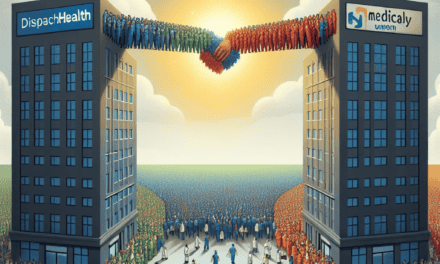Andrew Witty Resigns as CEO of UnitedHealth: A Comprehensive Analysis
In a surprising turn of events, Andrew Witty announced his resignation as the CEO of UnitedHealth Group, a leading healthcare company in the United States. His departure marks a significant moment in the healthcare industry, given Witty’s influential role in shaping UnitedHealth’s strategies and operations. This article delves into the implications of his resignation, the context surrounding it, and what it means for the future of UnitedHealth and the broader healthcare landscape.
1. Background of Andrew Witty and UnitedHealth Group
Andrew Witty has been a prominent figure in the healthcare sector for decades. Before joining UnitedHealth, he served as the CEO of GlaxoSmithKline (GSK), where he was instrumental in driving innovation and growth. His tenure at GSK was marked by a focus on research and development, leading to the launch of several groundbreaking medications.
In 2018, Witty took the helm at UnitedHealth Group, succeeding David Wichmann. Under his leadership, the company expanded its services and solidified its position as a leader in the healthcare industry. UnitedHealth operates through two main divisions: UnitedHealthcare, which provides health insurance, and Optum, which offers health services and technology solutions.
During Witty’s tenure, UnitedHealth experienced significant growth, with revenues surpassing $300 billion in 2022. His focus on integrating technology into healthcare delivery and improving patient outcomes has been a hallmark of his leadership. However, his resignation raises questions about the future direction of the company and the challenges it may face moving forward.
2. Reasons Behind Witty’s Resignation
While the official statement regarding Witty’s resignation did not provide specific reasons, several factors may have contributed to his decision. Understanding these factors is crucial for analyzing the potential impact on UnitedHealth and the healthcare industry as a whole.
- Market Pressures: The healthcare industry is facing increasing scrutiny from regulators, consumers, and investors. Rising costs, changing regulations, and the ongoing impact of the COVID-19 pandemic have created a challenging environment for healthcare companies. Witty’s resignation may be a response to these pressures, as he seeks to pursue new opportunities or address personal challenges.
- Strategic Shifts: UnitedHealth has been undergoing significant strategic changes, including a focus on value-based care and expanding its digital health offerings. Witty’s vision for the company may have diverged from that of the board or other stakeholders, leading to a mutual decision for him to step down.
- Leadership Transition: Leadership transitions are common in large organizations, especially in dynamic industries like healthcare. Witty’s resignation may be part of a broader strategy to refresh the leadership team and bring in new perspectives to navigate the evolving landscape.
- Personal Reasons: It is also possible that Witty’s resignation is driven by personal factors. Leading a major corporation can be demanding, and executives often face significant stress and scrutiny. Witty may have decided to prioritize his well-being or pursue other interests outside of corporate leadership.
- Investor Expectations: Investors have high expectations for growth and profitability in the healthcare sector. If Witty’s vision for UnitedHealth did not align with investor expectations, it could have led to pressure for a leadership change.
Understanding these potential reasons provides insight into the complexities of corporate leadership and the challenges faced by executives in the healthcare industry. Witty’s departure may signal a shift in UnitedHealth’s strategic direction, which could have far-reaching implications for the company and its stakeholders.
3. Impact on UnitedHealth Group
Witty’s resignation is likely to have significant implications for UnitedHealth Group, affecting its operations, strategic direction, and market position. The following are some potential impacts of his departure:
- Leadership Vacuum: Witty’s resignation creates a leadership vacuum that may lead to uncertainty within the organization. Employees, investors, and stakeholders may be concerned about the future direction of the company and how it will navigate ongoing challenges in the healthcare landscape.
- Strategic Reassessment: The new leadership team will likely conduct a strategic reassessment of UnitedHealth’s operations and priorities. This could lead to changes in the company’s focus areas, such as its approach to value-based care, technology integration, and market expansion.
- Investor Confidence: Investor confidence may be affected by Witty’s departure. If investors perceive the leadership change as a negative development, it could impact UnitedHealth’s stock price and market valuation. Conversely, if the new leadership is seen as capable and visionary, it could bolster investor confidence.
- Operational Continuity: Maintaining operational continuity during a leadership transition is crucial for any organization. UnitedHealth will need to ensure that its ongoing initiatives and projects are not disrupted during this period of change.
- Talent Retention: The resignation of a high-profile CEO can lead to concerns about talent retention within the organization. Key executives and employees may consider their future with the company, and UnitedHealth will need to implement strategies to retain top talent during this transition.
The impact of Witty’s resignation on UnitedHealth Group will unfold over time, and stakeholders will be closely monitoring how the company navigates this leadership change. The new CEO will face the challenge of maintaining the momentum established under Witty while addressing the evolving needs of the healthcare market.
4. The Future of UnitedHealth: Challenges and Opportunities
As UnitedHealth Group moves forward without Andrew Witty at the helm, it will encounter both challenges and opportunities that will shape its future. Understanding these dynamics is essential for anticipating how the company will adapt to the changing healthcare landscape.
- Regulatory Challenges: The healthcare industry is subject to a complex web of regulations that can impact operations and profitability. UnitedHealth will need to navigate these regulatory challenges while advocating for policies that support innovation and access to care.
- Technological Advancements: The integration of technology into healthcare delivery presents both challenges and opportunities. UnitedHealth has invested heavily in digital health solutions through its Optum division. The new leadership will need to continue prioritizing technology adoption to enhance patient care and streamline operations.
- Value-Based Care: The shift towards value-based care is reshaping the healthcare landscape. UnitedHealth has been at the forefront of this movement, but the new leadership will need to ensure that the company remains committed to improving patient outcomes while managing costs effectively.
- Market Competition: The healthcare market is becoming increasingly competitive, with new entrants and innovative models challenging traditional players. UnitedHealth will need to differentiate itself through its services, technology, and patient experience to maintain its market position.
- Consumer Expectations: Patients are becoming more empowered and informed consumers of healthcare. UnitedHealth will need to adapt to changing consumer expectations by providing transparent pricing, personalized care options, and improved access to services.
In summary, the future of UnitedHealth Group will be shaped by its ability to navigate these challenges while capitalizing on emerging opportunities. The new leadership will play a critical role in defining the company’s strategic direction and ensuring its continued success in the evolving healthcare landscape.
5. Conclusion: Key Takeaways from Witty’s Resignation
Andrew Witty’s resignation as CEO of UnitedHealth Group marks a pivotal moment in the company’s history and the broader healthcare industry. As we reflect on the implications of his departure, several key takeaways emerge:
- Leadership Matters: The leadership of a company significantly influences its strategic direction and operational success. Witty’s vision and leadership style have shaped UnitedHealth’s trajectory, and his departure raises questions about the future leadership approach.
- Adaptability is Key: The healthcare industry is dynamic and constantly evolving. UnitedHealth must remain adaptable to navigate regulatory changes, technological advancements, and shifting consumer expectations.
- Stakeholder Engagement: Engaging with stakeholders, including employees, investors, and patients, is crucial during leadership transitions. Transparent communication and a clear vision for the future can help build confidence and maintain momentum.
- Focus on Innovation: The future of healthcare lies in innovation. UnitedHealth must continue to invest in technology and innovative care models to enhance patient outcomes and remain competitive in the market.
- Long-Term Vision: While short-term challenges may arise from Witty’s resignation, UnitedHealth must maintain a long-term vision for growth and success. Strategic planning and execution will be essential for navigating the complexities of the healthcare landscape.
In conclusion, Andrew Witty’s resignation as CEO of UnitedHealth Group is a significant event that will have lasting implications for the company and the healthcare industry. As UnitedHealth embarks on this new chapter, stakeholders will be watching closely to see how the organization adapts and evolves in response to the challenges and opportunities ahead.





